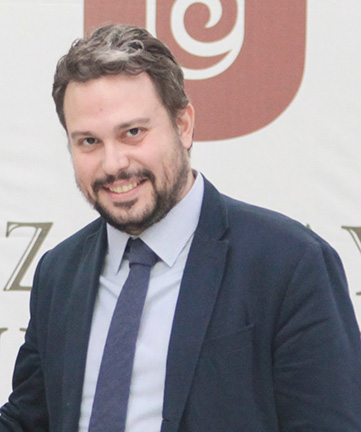
Costas Valagiannopoulos
For this installment of Senior Member Insights, we talk with Constantinos Valagiannopoulos. Costas is an associate professor in the department of physics at Nazarbayev University, Kazakhstan. Prior to this position, he was a postdoctoral researcher at Aalto University, Finland, and at the University of Texas at Austin, USA. During the last three years, Costas has also been a visiting assistant professor at Harvard, USA, and Southampton University, U.K. His research interests include artificial metamaterials, graphene, and their applications in photonic devices manipulating light (metasurfaces, absorbers, cloaks and lenses).
What first interested you in pursuing science?
Capturing the mechanisms of the physical phenomena, understanding the major parameters determining them and being able to explain them in simple terms.
Have you encountered a period where you have been discouraged in your pursuit of science?
Performing research is synonymous with searching for something new in scientific domains that have been scrutinized for many decades or even centuries. This quest for originality can be full of disappointments and discouragements, especially if you do not have a significant amount of experience or proper guidance. In such critical moments, one should not let the failure paralyze him/her. Trusting that these difficulties are just the price for success can be helpful in re-designing your strategy without losing faith.
Of the conferences you’ve attended, here been a stand-out topic/interaction that really stuck with you or changed your perspective?
Accomplishing seminal scientific achievements and presenting them in a fascinating way before an audience are two different things and do not go always together. However, in a few cases, I have found myself attending inspiring lectures by agenda-setting scientists; these were eye-opening experiences that significantly modified my perspective.
What tips do you have for effective networking and collaboration in your field?
Networking through scientific conferences or on-site research visits are important in establishing collaborations and becoming well-known within a field. A prerequisite for developing a contact for mutual cooperation is to carefully scan their research portfolio and plan your own contribution prior to approaching a person or a group.
Technical efficiency in building a collaboration is, of course, necessary, as is the ability to keep your promises in terms of delivering reliable results on time. Ultimately, the presence of moral values governing your professional activities is what builds trust and leads to long-standing, fruitful collaborations.
What have you learned by being a mentor to others?
When one mentors a student or a young researcher, one should combine the pressure to the trainee towards academic excellence and perfect performance with protection of the mentee from premature disappointments and unnecessary failures. Although, on many occasions, failure can be both necessary and beneficial.
What is one piece of advice that you wish you were given as a student/early in your career?
It would have been extremely helpful if I knew the pivotal role that the university brands play in the academic market. That is why I always encourage students and early-stage researchers to pursue a Ph.D. or postdoc at an institution as prestigious and globally respected as possible.
What are habits each day that help you to be successful?
Organizing the tasks of each day and fully executing every single of them is an old successful recipe; however, in such busy days, there is always the risk of spending all useful hours on everyday micro-management. One should also find time for strategic thinking towards new lucrative directions that usually are not on the daily to-do list.
How important are leadership roles in career development and how do you hone your leadership skills?
Leadership skills vary substantially with respect to the domain it is referred to; assets that are necessary in businesses differ from what is needed in politics and yet other assets are required in scientific research. A global feature that should accompany leadership, regardless of the area applied, is keeping the balance between deep technical knowledge of the pursued issues and formulating long-term inspirational vision.
What advice do you have for young scientists who are about to interview for their first job?
Be ambitious but not threatening. There are many cases that good scientists have been rejected just because they over-stressed their achievements or gave the impression during the interview that their potential hiring will work more as a hindrance than an asset in the daily life of the enterprise.
At this point in your career, what are you most looking forward to next?
I am already running the Metamaterials Modeling and Design Group at Nazarbayev University, Kazakhstan. It is a small team mainly comprising exceptionally talented undergraduate students, most of whom are winners in International Physics Olympiads. My aim is to produce on-site high-quality research, becoming a peripheral but distinct player in the global photonics market and, of course, sending my best students to pursue postgraduate studies at the top universities.
